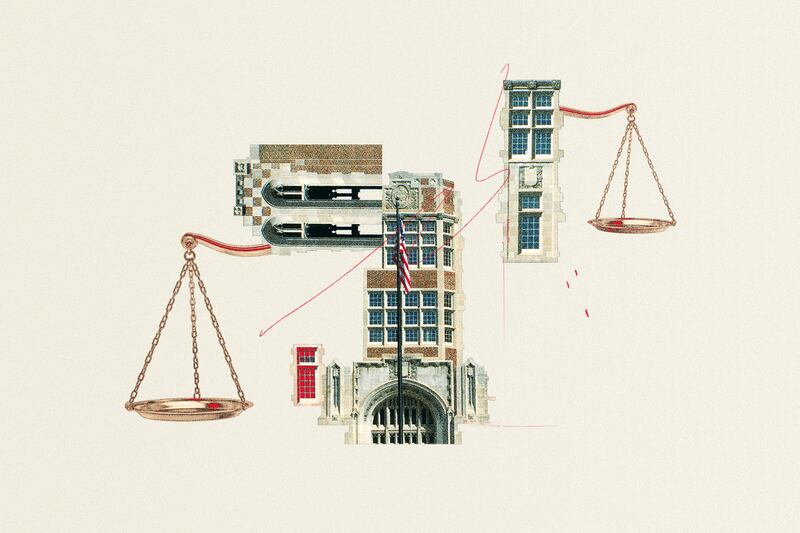There is no place like a college campus in late summer and early fall. The weather is beautiful, the energy is high, the possibilities are endless. A new crop of first-year students is exploring freedom in new ways. Football teams can still dream of undefeated seasons.
Next week, I begin my term as an Impact Scholar at the University of Utah, a place where the football team doesn’t just have lofty dreams but a real chance at a national title.
Whatever happens on the gridiron, the university is poised for big things, and I’m excited to be a part of it.
I’m especially honored to be giving the commencement address at the end of this academic year. Don’t ask me what I’ll be talking about quite yet — I want to take my time learning about the university first.
I should say how much admiration I have for the previous two Impact Scholars at the University of Utah, Tim Shriver and Arthur C. Brooks. Both men have strengthened institutions and made significant intellectual contributions on the subjects of identity, inclusiveness, civic life and diverse democracy. I’ve been around the table at the White House with Tim on numerous occasions discussing the role that government can play in bringing the nation together. And I am a regular reader of Arthur Brooks’ columns on happiness in The Atlantic. I am honored to follow in their footsteps.
I’ve been visiting Utah on and off for about 20 years now. I’ve spoken about interfaith cooperation at Utah Valley University, Utah State University, Brigham Young University (multiple times) and even at the U. way back in the mid-2000s.
The Beehive State feels different each time I visit — more people, more diversity, more dynamism. Indeed, a 2019 report from University of Utah’s Kem C. Gardner Policy Institute states that half of Utah’s growth in the next generation will come from minority populations.
How exciting. And also, daunting.
After all, diversity can just as easily lead to conflict as it can to cooperation. To achieve the latter takes real effort. Bridges do not rise from the ground or fall from the sky; people build them.
Harvard’s Diana Eck likes to put it this way: diversity is a fact, pluralism is an achievement. At my organization, Interfaith America, we define pluralism with a three-part framework: respect for diverse identities, relationships between different communities, cooperation on concrete projects for the common good.
Respect. Relate. Cooperate.
Simple to say, hard to do.
Every diverse society needs a place to practice pluralism. Enter universities. Where else do you get a wide range of identities converging in a small physical space, the intellectual resources to teach about the world’s great traditions and the co-curricular opportunities (intramural sports, student clubs, volunteer programs) to apply what you learn.
The dimension of diversity that I’ll be particularly focused on during my time as an impact scholar is religious diversity.
Faith gets short shrift in most conversations about diversity. That’s too bad, because religion is centrally important in American life.
The United States is the most religiously diverse nation in human history and the most religiously devout nation in the Western Hemisphere. Religion gives us binding narratives for our diverse democracy. Think Winthrop’s “city upon a hill,” Lincoln’s “almost chosen people,” King’s “beloved community” and Jane Addams’ “cathedral of humanity.”
Social capital is typically understood as civic stuctures that are beyond family, and faith communities are the single largest source of social capital in our country.
And religious identity is easily the most important dimension of identity in American law: protected in the Bill of Rights, the Civil Rights Acts of the 1960s and 1970s, the Religious Freedom Restoration Act of 1993 and umpteen Supreme Court cases.
I think the University of Utah could easily be a laboratory for interfaith cooperation and a launching pad for interfaith leaders.
University of Utah President Taylor Randall is clearly interested in this kind of work. He speaks of the pioneer heritage of Utah being encoded in the DNA of the university and refers to the university as a place where people can be anchored in their own identity, build bridges with people of other identities, have a wide array of experiences and engage in inspiring work across lines of difference.
He has powerful partners in both Utah Gov. Spencer Cox, who as president of the National Governor’s Association launched the “Disagree Better” initiative, and also The Church of Jesus Christ of Latter-day Saints, which has been emphasizing the importance of reconciliation in this time of polarization.
As church President Russell M. Nelson recently said, “Contention is a choice. Peacemaking is a choice. You have your agency to choose contention or reconciliation. I urge you to choose to be a peacemaker, now and always.”
Amen to that. Or as we say in my Muslim faith, Ameen.
Peacemaking is an ethic. It is also a knowledge base and a skill set. Advancing these is the specialty of universities.
There is a great line about the key role that universities play in a society: If you want a great city, build a great university and wait a hundred years.
A network of great universities has already made Utah a great state. I’m looking forward to learning from your impressive journey thus far, and to being part of the team at the public flagship that helps the state go from strength to strength.
Eboo Patel, the founder and president of Interfaith America, is a contributing writer for the Deseret News, the author of “We Need to Build: Field Notes for a Diverse Democracy” and the host of the podcast “Interfaith America with Eboo Patel.”


